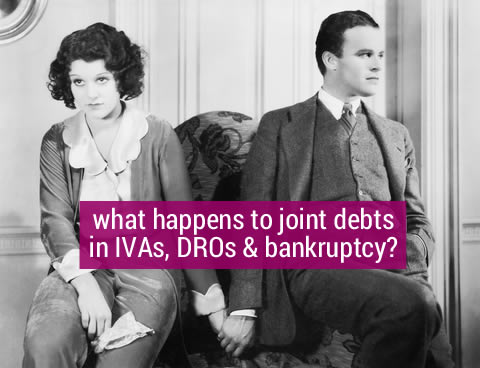A reader asked:
I have received a letter saying we still owe £4,000 in council tax. The debt was included in my bankruptcy a few months ago but they are chasing my wife for the full amount, what should we do?
This article looks at what happens to joint debts which are unsecured, not mortgages or secured loans. It covers all three forms of insolvency – bankruptcy, DROs and IVAs – because the answers are much the same for unsecured debts in all of them.

Common types of joint debts
A joint debt is a debt which has two people’s names on it, where they are both responsible for the full amount of the debt. Common joint debts include:
- overdrafts on a joint bank account;
- loans (including guarantor loans); and
- council tax.
With overdrafts and loans, both people have to have agreed to the credit at the start. If your partner – or your ex – has taken out a joint debt with your name on it that you didn’t know about, or that you were pressured into agreeing to, you need advice on your options, ask at your local Citizens Advice.
The solvent person will be asked to pay the debt
Joint debts have to be included in insolvency. You can’t ask for a debt to be left out on the grounds that the other person will carry on paying it.
When a joint debt is included in an insolvency, the creditor will ask the solvent person to repay all the remaining debt – not just “their half”. For a loan, this can be just carrying on making the normal monthly payments.
In an IVA, the creditor will receive some payments, called “dividends”, from the IVA. These will reduce the amount of debt the other person has to repay. For example, if there is a joint loan with £4,000 outstanding, and the IVA is giving “25p in the £” to the creditors by the end, the lender will receive £1,000 from the IVA and the other person only has to repay £3,000.
In bankruptcy, creditors rarely get any money back. This usually only happens if there is a house with a lot of equity that is sold. Normally the creditors get nothing, so the other person has to repay the full amount of a joint debt.
In a DRO, the creditors will always get nothing as the person in the DRO doesn’t have to make any payments at all. So the other person has to repay all of a joint debt.
The solvent person’s options
It is always a good idea for someone to look at their own financial position if their partner opts for any of the types of insolvency. If they can’t easily manage their own debts, they need to consider their debt options, taking into account:
- that their “own debts” will include any previously joint debts that are going to become their full responsibility; and
- if their partner is having to make monthly payments, for example to an IVA, they may have to pay more of the household expenses than before, leaving less money to repay their own debt.
Small joint debts may not make much difference, but larger ones can tip what was manageable debt over into being unmanageable.
The reader who asked question at the start said his wife’s only income was disability benefits. She had some small credit card debt which wasn’t a problem, but the addition of the council tax arrears means she should probably look at the option of a DRO.
What about credit records?
With joint loans or an overdraft with someone who is going bankrupt, entering an IVA or a DRO, your credit records are “financially associated” with your partner’s. So their insolvency is going to harm your credit score.
Perhaps you had already been paying a joint loan before your partner entered an IVA. Even though you carry on paying it afterwards, with no missed payments or defaults, your credit rating will still be affected by their IVA.
The only way round this is for you to repay all the joint debts as quickly as possible – ideally before your partner’s bankruptcy, DRO or IVA starts! When all joint debts are settled, you can ask for the financial link with your partner to be deleted. See for example Experian’s form to request this.



Andrew says
Hi quick question.
Can the Insolvency Practioner during bankruptcy request to see a joint account? Only one person is bankrupt and the other isn’t.
Also. When doing an expenditure if one partner who isn’t bankrupt earns nothing as they aren’t working do they just go off the bankrupt persons earnings?
Sara (Debt Camel) says
I’m sorry I missed your question and so am replying very late…
Yes the official receiver can ask to see joint bank account statements. It’s worth adding that if you have a joint bank account you should really close it and switch to two separate accounts before going bankrupt, otherwise one partner’s bankruptcy is going to affect the other partner’s credit record.
If the person going bankrupt has a partner who isn’t working, then when their case is being assessed for an IPA, all the household expenditure will be included. I hope that answers your concerns as your question was a bit oddly worded.
Jim says
And please, please, please, do discuss your debts with your partner if you’re wanting to go into an IVA (or anything else for that matter).
Sara (Debt Camel) says
Good point!
Ben says
I’m asking for my new partner she is separated
both her and her ex husband are with step change hes applied for a DRO 2 of the debts are joint she struggles to pay step change now but she is keeping up with her repayments he is picking and choosing when to pay step change does the insolvency agency need to contact her to inform her that her ex partner has applied for a DRO due to it being a joint debt.
Sara (Debt Camel) says
“does the insolvency agency need to contact her to inform her that her ex partner has applied for a DRO due to it being a joint debt.” no – but she knows anyway, so why does this matter?
If she is struggling, perhaps she should be looking at her other options? I suggest she talks to StepChange about this – she should have her DMP separated from his DMP and have her situation reviewed.
Susan says
My son has just found out that his ex partner has an IVA. This includes a debt for a loan she took out while they were together and he co signed. He has received a load of statements , backdated, with an apology saying they should have informed him and sent him statements. Is there anyway he can get his name removed from this IVA?
Sara (Debt Camel) says
His name isn’t on her IVA.
His credit record will be affected by her IVA until there are no joint debts, so he has to pay the outstanding loan.
Jennifer says
Hope ur ready for this.
I have dept of £19000
My husband £16000
Joint £1000
He earns a wage of £1600
I don’t work as have 4 children 1-12 years. We get UC £1000 and child benefits £200 roughly.
I was told to get IVA of £110 Each
I have been told we cant do dro as dept is too much. However my husbands defo isn’t. I was told that the benefits would be included in the incomings which means he was over £50. Is this true? Or is it just his income if I go ahead with bankruptcy/ IVA too. I was told he would be treated as a single person so less allowance for expenses yet he isn’t and still in a family of 6.
Also if I went bankrupt, would his wage be included in income or just the benefits? Baring in mind he would be on a DRO.
So basically
Who’s money is included for individual cases?
Sara (Debt Camel) says
“I was told to get IVA of £110 Each” who told you this?
JT says
Hi I entered into an IVA last year and the IVA company took my wife’s salary into account (in full) as part of the household income, which to be fair I understand they have to.
However, what they didn’t take into account was my wife’s personal debts, they allowed £88 per month out of the total income for my wife’s approximately £700 per month debts that she was paying.
What can I do? I’ve tried speaking to my IVA about this but they just keep saying that they’ve made an allowance for this.
Sara (Debt Camel) says
how large are your wife’s debts?
do you have any assets – are you renting? do you own a car or have one on finance?
how large are your debts that went into the IVA and what are your monthly payments?
JT says
WIfe’s debt <20k
No assets, we rent. My total debts were just over 30k or I would have gone straight for a DRO. we both have cars on finance.
Sara (Debt Camel) says
Well your current situation cannot continue. Why did you agree to this IVA when your wife would not be able to pay her debts?
I think you should both talk to National Debtline on 0808 808 4000 about your situations and the op[tions that you both have.
Katie says
Hi,
I am hoping to enter into an IVA for my 35k debt. My issue is my wife wants no repercussions on her end but we have one 4k joint loan she will carry on paying this but as it has to go on my IVA will her credit score be affected?
Sara (Debt Camel) says
Do you also have a mortgage? Do you own a car or have one on finance?
Do you have a joint bank account?
What is your wife’s credit record like? Could she refinance that joint loan so it is settled and you no Longer have a joint account?
Katie says
My wife has a shared ownership home with 25% mortgage and 75% rent. Im not on the deeds or the mortgage but ofcourse were married. I have a car that isn’t on finance worth around 5k.
No joint accounts.
My wife has a good credit rating. I was told by the IVA company that my wife getting a loan out wouldn’t be a good idea due to the other company’s likely to refuse an IVA as the one bank would get paid back and not the others “unfair treatment” he claims.
Sara (Debt Camel) says
Which IVA firm are you talking to? That advice seems… surprising. You are not giving any preference if someone else chooses to clear a joint debt. And your other creditors will get more, so your IVA will not have to make any payments to this settled debt.
How much do you expect to pay a month in the IVA? Do you expect your own finances to improve?
How much do you pay to help with the rent and mortgage? And other bills?
Katie says
Money Advice is the IVA company. I’ve been quote £120 payback a month for 5 years and the remaining get written off. I currently pay £1100 off debts a month. I pay 50% to my wife from mortgage, rent, bills, childcare, food etc.
I should add that currently I’m working 100 hrs a week to survive and I need to go back to my 35hr weekly contract for my physical and mental health.
Sara (Debt Camel) says
When does your wife’s mortgage fix end?
And when will your childcare costs start to drop a lot?
Katie says
She will need to update mortgage in April 2025. We will be entitled to 15hrs free childcare in September 2024 which will half our current £450 monthly childcare bill.
Sara (Debt Camel) says
Ok so some points about IVAs in general:
– that £120 a month is not fixed. If you earn more or your expenses drop, it will go up. Eg when your childcare costs drop
– £120 a month h leaves very little “wiggle room” if things get tight. About a third of IVAs fail because people can’t manage to keep paying them for 5 years. If your costs go up more than £50 a month your IVA may well fail leaving you back with the debts and a wrecked credit rating
Yes you definitely need to cut those hours. Insane.
I have no idea why that IVA firm is suggesting your wife doesn’t refinance that joint debt. It sounds mad to me. It’s important that your wife’s credit record is not affected as otherwise it will be much harder for her to get a remortgage with a different lender (though she may prob be be to get. New fix from her current mortgage lender)
. Perhaps they are just desperate for you to sign on the dotted line now so they get their large fees… and they don’t want you to take a few months to sort things out.
I suggest you talk to StepChange about this refinancing. See if they think it would be problem. StepChange also do IVAs but they give a more balanced assessment and don’t push people to take poor decisions.
I would suggest an alternative approach;
– refinance that loan
– de-associate your credit records
– reduce your hours
– ask your creditors for payment arrangements for a couple of months while you take proper debt advice
– wait until April when you will know what the rent, council tax, broadband, water etc are all going up to. Then reconsider an IVA with stepchange
Katie says
Thank you so much for your great advice. I will do all the steps above.
John says
Hi there, I was declared bankrupt last month. One of the debts is a joint loan with my partner for just over £8k. I was advised by the bank that they couldn’t do anything with this debt during the 12 months of my bankruptcy, however they are now sending letters to my partner demanding full payment and threatening legal action. They’ve also said they could take money from her account she holds with them to settle the debt. She doesn’t have the money and most of her wages are used towards household bills. My salary covers most of the household bills and then I have an IPA set up for next 3 years. Can you advise as she’s called the bank and received conflicting information each time.
Sara (Debt Camel) says
does your partner have other debts as well?
John says
She has a credit card and loan with same bank that she pays each month, she also has a couple of catalogue accounts that she makes monthly payments on. Total debt is around £5k, plus this £8k
Sara (Debt Camel) says
Joint loans are on the basis of “joint or several liability” – the lender can choose to ask her to pay the loan as you are no longer paying. I don’t see any reason why they would wait a year before doing this.
It would be sensible for her to move to using a different bank account. If she cannot afford to make these loan repayments, she needs to take debt advice – she could look at a debt management plan for all her debts, including this one/ or a form of insolvency herself. I suggest she talks to National Debtline on 0808 808 4000